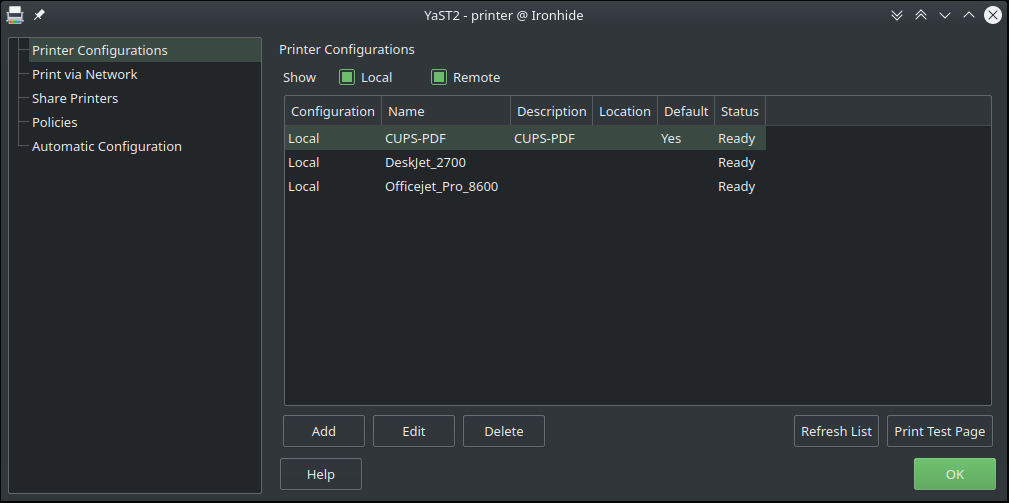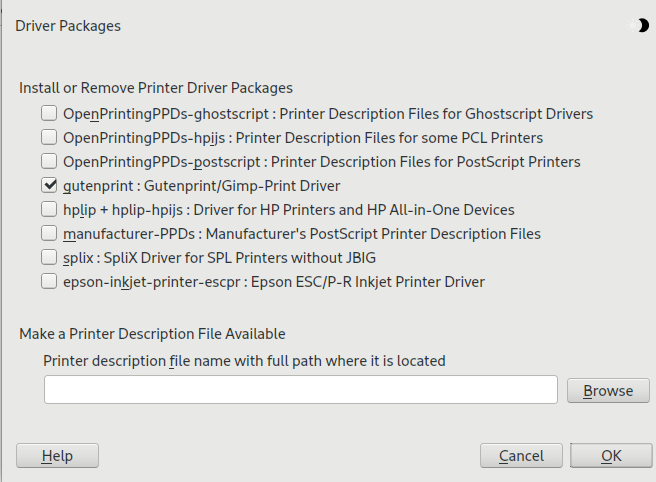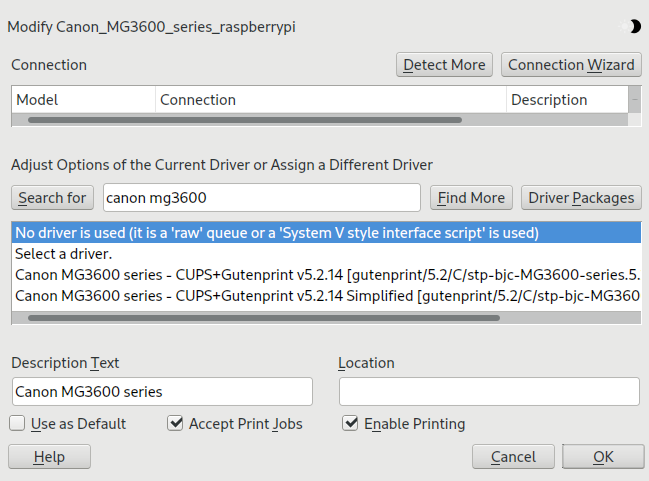I have been distro hopping for about 2 weeks now, there’s always something that doesn’t work. I thought I would stick with Debian and now I haven’t been able to make my printer work in it, I think I tried in another distro and it just worked out of the box, but there’s always something that’s broken in every distro.
I’m sorry I’m just venting, do you people think Ubuntu will work for me? I think I will try it next.
I’ve been using Linux for 10y and never distro-hopped to solve a problem. Overall I’ve only used 3 distros as daily drivers. IMO you should look into making things work with a distro you like instead of looking for the perfect off the shelf distro.
Yeah you’re probably right, which distro do you use?
kubuntu and endeavouros
Just gotta learn to fix stuff yourself. Highly unlikely for any distro to be perfect out of the box.
Easier said than done sometimes. That’s the advantage of Ubuntu, Mint, etc. — they minimize the number of weird quirks you run into.
When I install Linux for friends and family the only distro I use anymore is Fedora. I have used just about every major distro, and Fedora is the only one that has “just worked” on every computer I have tried it on.
Love them, or hate them, Red Hat is by far the single biggest company in the Linux community, and their Red Hat Enterprise Linux is renowned for being stable, performant, and very well supported. Fedora is where most of the updates that make their way into RHEL are initially available, so with Fedora you get a cutting edge distro with the backing and resources of a massive corporation that employs many of the top Linux-desktop contributors.
If you want a distro that “just works” I strongly recommend you give Fedora a try.
The only reason you should ever distro hop is for fun
You will get tons of distro recommendations, so here is one more: OpenSUSE, then use the YAST GUI GTK application select Yast Printer it has a GUI tool for all kinds of printer setup options and will show recommended drivers based on printer type, it then installs them via that GUI. Not to be confused with the regular printer settings app you see in most distros.



I worked with SuSE. I still have PTSD over how badly it’s built. Never again.
How long ago? Everyone has an opinion and preference, but SUSE and RHEL are the only two certifed distros for corporate/ enterprise use of Teamcenter PLM and NX CAD…so it cannot be as “badly” built as you feel it is because it has to perform everyday with the least amount of issues.
OP, my request/suggestion would be the following:
In order for us to better help you consider the following:
- Inform us on your hardware specs. You could even rely on the software found on linux-hardware.org for a (so-called) probe.
- Inform us on which distros you’ve tried. If possible, for each one of them list the following:
- What exactly didn’t work?
- Did you try any troubleshooting?
On a more general note, you shouldn’t feel the need to switch distros even if other distros might offer more convenient solutions.
Story time
When I was new to Linux, I wanted to rely on the Chromium browser for cloud gaming through Nvidia GeForce NOW’s web platform. For some reason, I just wasn’t able to get this to work on Fedora. Somehow, while still being mostly a newbie, I stumbled upon Distrobox and decided to give it a go in hopes of allowing me to overcome the earlier challenge by benefiting of the ArchWiki and the AUR through an Arch distrobox. And voila; -without too much effort- it just worked. More recently, after I’ve become slightly more knowledgeable on Linux, I just rely on a flatpak to get the same work done.
Moral of the story would be that there are a lot of different ways that enable one to overcome challenges like these. And unless you feel the need to go with a system that’s (mostly) managed for you (à la uBlue)[1], you will face issues every now and then. And the only way to deal with them would be to either setup[2] (GRUB-)Btrfs+Timeshift/Snapper (or similar solutions) such that it automatically snapshots a working state that you might rollback to whenever something unfortunate befalls your system or to simply become ever so better equipped in troubleshooting them yourself.
- But therefore demands from you to engage with the system in a specific (mostly unique) way.
- Or rely on a distro that sets it up for you.
do you people think Ubuntu will work for me?
Yes.
Seconded. Just don’t run it on incompatible hardware, okay? 😹
There is not a single distro where everything works out of the box. I would be very surprised if even Windows or MacOS work exactly like you expect, the second you boot into them the first time.
I like Arch / EndeavourOS, but you will definitely need quiet some configuration for them. If you want more user-friendly or more up-to-date Debian, try Sparky Linux. It’s honestly quite good. Instead of Ubuntu you might want to give Mint a try. Many fancy it as a more open and less corpo alternative.
Ubuntu itself is alright, but it’s being criticised for pushing anti-consumer moves lately (i.e. forcing Snaps and telemetry onto them). Also, updates on Ubuntu are extremely slow in my experience. Maybe that has changed, but in some areas I doubt it.
Linux is kinda like a 3d printer. You can end up tinkering and tuning more than printing.
2d printers are just cursed and have been since the dawn of mankind though. Go to https://openprinting.org/printers/ and see if your printer is in there and if it is which functionality header it is under. I’m assuming it isn’t capable of driverless if debian didn’t work and the other distro just happened to have something preinstalled. Unless debian doesn’t handle driverless printing out of the box. I’ve only used debian headless for server stuff so I’m just making assumptions.
Arch maintainers recommend against aur helpers but for quite some time I just did exactly that and got the drivers for whatever jank ass printer I had at the time that way. Most of the official ones I have encountered are rpm and I hadn’t used fedora or other rpm distros until recently, and the aur pkgbuilds would unpack the rpm and install the drivers the arch way. Incidentally, last I tried silverblue/ublue/kinoite etc can’t install the brother printer rpms via rpm-ostree so having a driverless capable printer was lucky considering it was just randomly given to me by a friend that moved away.
If you share the printer model, someone here can probably also figure out what needs to be done without you having to go through a bunch of troubleshooting too.
This is the kind of post that scares me away from trying Linux.
I was in the same boat but Linux Mint just literally worked. Easiest transition ever. I keep my Windows dual boot because I need MS Office for work but I’m in mint 95% of the time with no tinkering.
Then stay away. If you don’t like to tinker with things it’s not for you.
Ubuntu will work, sticking to Ubuntu based system is good to have stuff just work. For Gnome UI just use Ubuntu, for KDE use Kubuntu.
If you don’t like Ubuntu as a company you can always use these instead: PopOS for Gnome and KDE Neon for KDE. Both are very stable with great support. I’ve been running KDE Neon for years now.
Out of curiosity, what distros did you try?
Hi, I tried endeavor, Linux mint, manjaro, mx Linux, and I don’t remember what else. I have a question, is Gnome really popular? For me it doesn’t make sense, it feels it was made for tablets or something like that.
Absolutely, it’s very popular. It’s pretty similar to MacOS since it comes with a global menu by default. It’s pretty popular since the design is very consistent and looks good. They also have excellent support for new features (except Wayland). Gnome is popular with people that only want to customise the most important ports and just want a standard OS that is well thought out and accessible.
I do watch a lot of content about Linux distros, but I’m not a Gnome user so I can’t give good examples of customisation and differences between KDE and Gnome.
Here’s a review from a guy on YouTube I like on Gnome 45 that used Gnome as a daily driver for years. https://youtu.be/RQSA0nZaF6M?si=7UUEmWKG41gaU0uS
Btw, can replicate the same layout on KDE because of the high level of customization it provides. It can all done through the UI, as all OS changes should be done.
For first time plug-n-play distros, I either go with Linux Mint or Fedora, for me they have the best results for just working.
And make sure when installing them, you always check to use proprietary drivers and codecs if it’s an option, that will save you a bunch of trouble down the line.
Funnily enough, Fedora is the only distro I’ve ever had and still have the infamous Linux sound driver problems with
If you’re sticking with Deb based distros. Ubuntu Kubuntu - same as Ubuntu but kde Kde neon Pop_os
You might could try Manjaro. I have pretty good luck with it.
It’s not Deb or apr. But it has the aur.
Good luck op!
EndeavourOS is pretty good, too; also Arch-based with an easy installer.
The advantage to Arch-based-distros is rolling releases, and the Arch wiki instructions are more easily followed. And right now, the Arch wiki is probably the single best resource for Linux instructions and troubleshooting on the web.
If I remember correctly I liked manjaro and endeavor when I tried them, but the “night color” feature which is very important to me wouldn’t work Idk why.
Ah I don’t use that so I can’t speak to it.
:/
does night light actually work? I used them for a while, turned it off for color and I didn’t notice a difference. Isn’t it just placibo or just very minimal effect?
BTW distro is the cure for this kind of anxiety.
I’ve found ubuntu distros to be pretty good for 'stuff just works". My daily driver is xubuntu. That said, I’ve never tried using a printer with it. Good luck OP.






